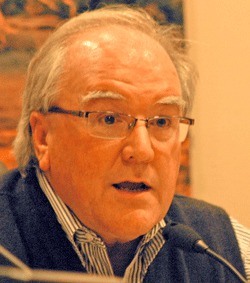After six years of plotting the course for the state ferry system, David Moseley is handing over the helm.
Moseley announced his resignation March 18. His final day on the job is April 15.
In a statement about his pending departure, Moseley, who inherited an agency awash in financial struggles and facing uncertainty of how to maintain or replace a fleet of aging boats, said that the state ferry system is positioned better than it was when his tenure began in 2008.
“I’m pleased with the progress we’ve made,” he said. “But it is now time for the next person to build on our successes, correct our mistakes and continue to move the system forward.”
(To read Moseley’s statement in its entirety, click here).
A former city manager in Federal Way, Ellensburg and Steilacoom, and former head of community development in Seattle, Moseley was 60 years old at the time he was selected for the job from a field of 64 applicants. He replaced Mike Anderson, a longtime ferry system administrator, who stepped down after three years as chief of Washington State Ferries.
At the start of his tenure, Moseley set out four priorities that would be top concerns for Ferries: building new boats, better maintenance and preservation of the fleet to ensure reliability of service, improved communication with ferry dependent communities and customers, and securing a stable, sustainable source of funding for capital and operating expenses.
“I believe we made real, tangible progress on all those priorities,” he said.
Still, Moseley noted that sustainable funding for the ferry system overall remains elusive even though a dedicated source of funding for Ferries’ construction program was just recently established by the Legislature. The state ferry system lost 22 percent of its annual revenue when voters approved Initiative 695, in 1999, which repealed the state’s former motor vehicle excise tax, and its operating have soared sharply since that time as fuel prices have escalated.
“While we made real and significant progress in the 2014 session, financial sustainability has been and remains WSF biggest challenge,” he said.
Lynn Peterson, secretary of Washington Department of Transportation, the parent agency of state Ferries, praised Moseley for helping to spur the construction of new boats, improving and broadening WSF’s communication with the public, and implementing a reservation system.
“Under David’s watch, WSF has reached out to its customers with more than 450 meetings in ferry communities, provided weekly ferry activities emails, and implemented new online tools such as ‘Fleet Watch’ and ‘Terminal Conditions’ to help customers better plan their travel,” Peterson said in a press release. “With a successful implementation of a vehicle reservation system on three routes, WSF will expand the reservation system to the San Juan Island routes.
Moseley said that he’s unsure of what he will do next, and that he expects to explore potential opportunities over the next several months. The Department of Transportation will begin a nationwide search to find someone to fill Moseley’s position, Peterson said.




